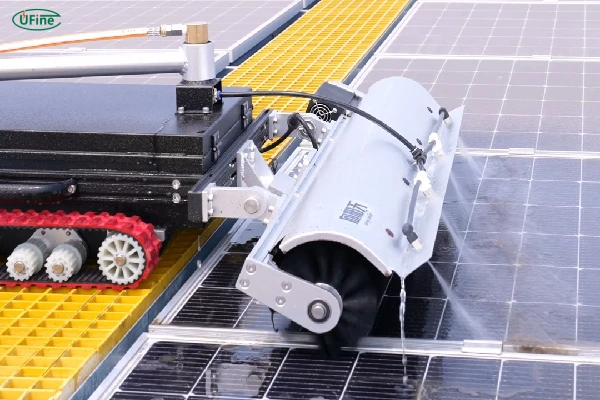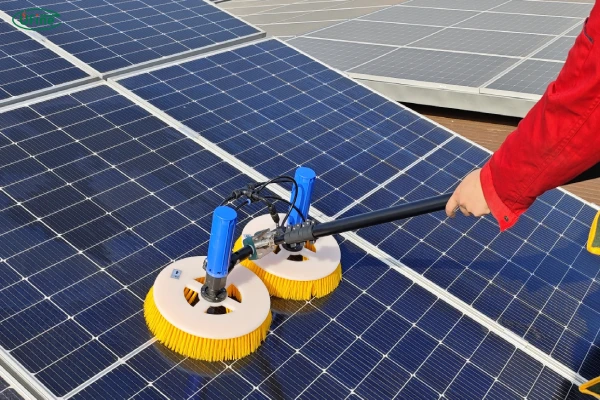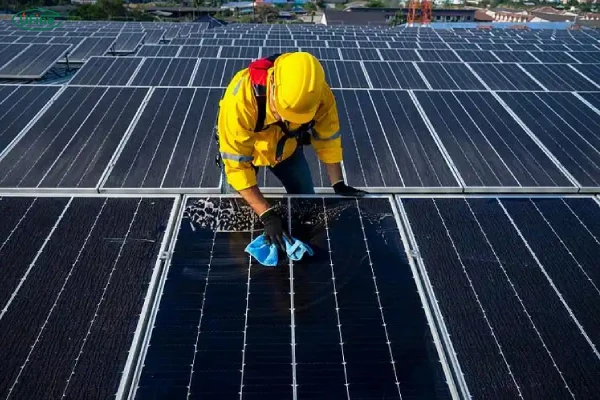With the increasing adoption of solar energy worldwide, maintaining the efficiency of solar panels is more important than ever. According to the Solar Energy Industries Association (SEIA), solar energy capacity in the U.S. has increased by 42% in the last five years, which signifies the growing importance of solar panels in both residential and commercial energy systems. However, many users often overlook a crucial aspect of solar panel maintenance—cleaning. Dirty panels can reduce efficiency and increase costs. In this guide, we will walk you through everything you need to know about how to clean solar panels, from identifying when they need cleaning to how to do it safely and effectively.
Part 1. Why do you need to clean solar panels?
Before diving into the details, it’s important to understand why cleaning your solar panels is so crucial. Over time, dirt, dust, debris, and even bird droppings can accumulate on the surface of your solar panels. This buildup can block sunlight from reaching the photovoltaic cells, which may lead to reduced energy output. In fact, a study by the National Renewable Energy Laboratory (NREL) found that soiling can reduce solar panel efficiency by as much as 20%. Regular cleaning ensures that your panels work at their optimal efficiency, extending their lifespan and saving you money on energy bills.
Part 2. Signals that solar panels should be cleaned
How do you know when your solar panels need cleaning? Here are some common signs:
- Reduced Energy Output: If you notice that your solar panels are not producing as much energy as usual, it may be a sign that they are dirty.
- Visible Dirt or Debris: If you can visibly see dirt, dust, or bird droppings on your panels, they likely need cleaning.
- Heavy Rain or Dust Storms: After a rainstorm or dust storm, it’s important to inspect your panels. The buildup of minerals or dirt can significantly impact efficiency.
Part 3. Common tools for cleaning solar panels
What tools are best for cleaning solar panels? The right tools are essential for avoiding damage and ensuring a thorough cleaning.
- Soft-Bristled Brush: A soft brush is gentle enough to avoid scratching the surface of the panel while removing dirt and dust.
- Non-Abrasive Sponge: For panels with stubborn dirt, a non-abrasive sponge will help you scrub the surface without causing any damage.
- Squeegee: This tool is great for drying your panels and preventing streaks after cleaning.
- Extension Pole: If your panels are on the roof, an extension pole with a brush attachment is essential for safely reaching them.
- Water Spray: A gentle spray from a hose or a bucket of water can help to loosen debris before you scrub.
Part 4. What Is the best thing to clean solar panels with?
The ideal cleaning solution for solar panels is simple: clean, lukewarm water. You do not need harsh chemicals or detergents that could leave residues or damage the panels. For tough stains, you can mix a small amount of mild soap with water, but always ensure you rinse thoroughly afterward.
Part 5. How should you effectively clean solar panels?
Here’s a simple step-by-step process on how to clean solar panels effectively:
- Turn Off the System: Before cleaning, always disconnect the solar system to avoid any electrical hazards.
- Inspect for Damage: Check the panels for any visible damage. If you notice cracks or other issues, it’s best to consult a professional.
- Choose the Right Time: Clean your panels either early in the morning or late in the evening to avoid the risk of the glass cracking due to sudden temperature changes. Avoid cleaning during the peak heat of midday.
- Use Water to Soften Dirt: Use a gentle stream of water to soften dirt, dust, and debris. If possible, use deionized or distilled water to avoid mineral buildup.
- Scrub Gently: Use a soft brush or sponge to scrub the panels gently. Avoid excessive pressure to prevent scratches.
- Rinse and Dry: After scrubbing, rinse the panels thoroughly with clean water and use a squeegee to dry them to prevent streaks.
Part 6. How to clean solar panels on roof?
Cleaning solar panels on a roof requires more caution and safety. Here’s a guide to help you:
- Use an Extension Pole: For safety reasons, avoid standing directly on the roof. Use an extension pole with a brush to reach the panels.
- Check Roof Stability: Before climbing, ensure that the roof is stable and that you have a secure ladder for access.
- Avoid Using Harsh Chemicals: Stick to water and mild soap to avoid damaging both the panels and the roof.
Part 7. How to clean solar panels from the ground?
If you prefer not to go up on the roof, it’s possible to clean your solar panels from the ground with the right tools:
- Use a Long-Handled Brush: Attach a soft-bristled brush to a long pole, which will allow you to scrub the panels without needing to get on the roof.
- Water Spray System: A water spray system attached to a hose can help rinse the panels while keeping you safely on the ground.
Part 8. How to clean solar panels without water?
In areas where water is scarce, you can clean your solar panels without using water. Here are some alternatives:
- Dry Brushes: Use a dry, soft-bristled brush to remove dust and debris.
- Compressed Air: In some cases, compressed air can be used to blow dust off the panels without needing to wet them.
Part 9. Tips for cleaning solar panels
- Regular Maintenance: Clean your panels at least twice a year. However, if you live in a dusty or high-pollution area, more frequent cleaning may be required.
- Avoid Abrasive Materials: Never use abrasive materials like steel wool or rough sponges that could scratch the glass.
- Don’t Walk on Panels: Avoid stepping on the panels, as this can lead to damage.
Part 10. Locations that may need more frequent cleaning
- Desert Areas: Solar panels in desert climates often accumulate more dust and dirt, requiring more frequent cleaning.
- Coastal Areas: Salt buildup from the ocean can also impact the efficiency of solar panels in coastal areas.
- Pollution-Dense Areas: Cities with high levels of air pollution may see more debris and dirt on their panels.
Part 11. Safety tips for cleaning solar panels
- Use a Sturdy Ladder: Always ensure that your ladder is stable and secure before climbing up to clean your panels.
- Avoid Electrical Contact: Be sure the solar system is turned off before cleaning to avoid the risk of electrical shock.
- Wear Protective Gear: Gloves, goggles, and a harness can help ensure your safety while cleaning.
- Do Not Use Pressure Washers: High-pressure water can damage the panels and dislodge connections.
- Check the Weather: Never clean your panels in extreme weather conditions, like during a storm or high winds.
Part 12. When should I ask a professional to clean my solar panels?
If your panels are difficult to reach, or if you notice any damage, it’s best to call a professional. A certified technician can handle complex cleaning situations and assess the overall health of your solar panels.
Part 13. FAQs
1. How often should I clean my solar panels?
Most systems benefit from cleaning twice a year, but frequency depends on your location and environmental conditions.
2. Can I use a pressure washer to clean solar panels?
No, high-pressure washers can damage the panels and void warranties.
3. What is the best time of day to clean solar panels?
Early morning or late evening is ideal, as the panels are cooler and less likely to be damaged by sudden temperature changes.
4. Can I clean solar panels myself?
Yes, with the right tools and precautions, most homeowners can clean their solar panels effectively.
5. How do I clean solar panels in winter?
Use warm water to prevent freezing and avoid walking on snow-covered panels to prevent damage.
Related Tags:
More Articles

How to Choose the Best Floor Scrubber Battery for Commercial Cleaning?
Selecting the ideal floor scrubber battery ensures a long runtime, rapid charging, and minimal maintenance for efficient commercial cleaning operations.
Battery for Blower vs Battery for Leaf Vacuum: Which One Should You Choose?
Battery for blower vs leaf vacuum—learn the key differences in power, fit, and runtime to choose the right battery for your outdoor tool needs.
How to Choose the Right Battery for Blower?
Choosing the right blower battery? Consider voltage, capacity, chemistry & usage. This guide helps match the best battery for peak performance.
How to Choose the Best Insulated Battery Box for Lithium Batteries?
Choosing the Best Insulated Battery Box for Lithium Batteries? Discover key factors such as size, material, and safety for optimal protection and performance.
7 Critical Elements on a Lithium Battery Shipping Label
What must be on a lithium battery shipping label? Learn 7 key elements to ensure safety, legal compliance, and correct handling across all transport modes.






